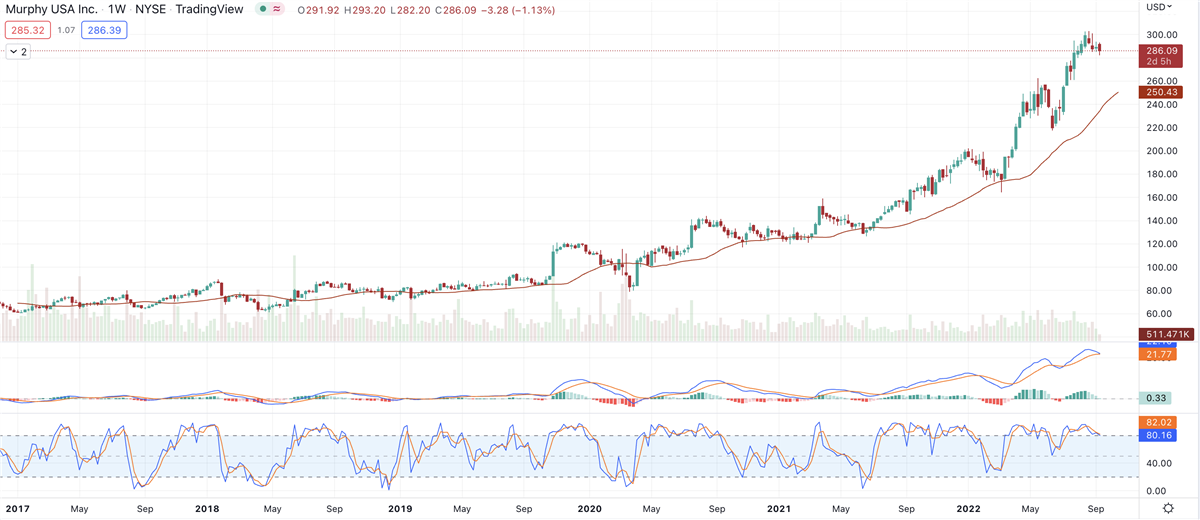
Around six or seven years ago, a new gas station operated by Murphy USA (NYSE: MUSA) opened across the street from a Super Walmart (NYSE: WMT) not far from where I live in Santa Fe, New Mexico.
Since then, I’ve noticed Murphy gas stations springing up throughout the U.S. While the company sells gas at the pump, it’s not classified as an “energy” stock, as it also operates convenience stores.
The stock has been in a very moderate pullback since late August, outperforming its index, the S&P Midcap 400, tracked by the SPDR S&P MIDCAP 400 ETF (NYSEARCA: MDY). Murphy has a market cap of $6.630 billion, putting it squarely in the mid-cap territory, meaning that the index offers a more significant comparison than the large-cap S&P 500.
Murphy USA went public in 2013 as a spinoff from Murphy Oil (NYSE: MUR). The chain operates stores close to Walmart parking lots and until 2016, was purchasing land from Walmart. Since then, it’s been opening locations independent of the retail giant.
The company reported second-quarter results on July 28, earning $7.53 per share, up 57% from a year ago. That trounced views of $4.65 per share.
Revenue came in at $6.766 billion, up 57%. MarketBeat earnings data show that Murphy USA beat both top and bottom-line views in each of the past five quarters.
Analysts have a “moderate-buy” rating on the stock, with a price target of $276.67, a downside of 2.20%.
Reduced Earnings Expectations
There’s a hint of why analysts may have tepid expectations: For this year, Wall Street is eyeing earnings per share of $23.38, up 57%. However, in 2023, that’s seen declining by 38%, to $14.38 per share.
In its quarterly report, Murphy said operating expenses would continue increasing, in a familiar refrain.
The company said, “Operating expenses in our stores have experienced labor pressures which have caused us to increase overtime spending and offer incentives to attract and retain qualified employees to run our business including a special bonus to our employee base that will be paid out over the second and third quarters of 2022.”
In the company earnings call, CEO Andrew Clyde focused on bonus programs designed to recruit and retain workers. He noted the applicant flow is once again back to pre-Covid levels.
“I would say beginning in about April of this year, we saw improvements in that applicant flow, getting over 20,000 again for the first time,” he said. “That's continued into May and June and July, and so we feel much better about the applicant flow. I would say on the margin we probably have to go through a few more applicants to get the staff we need, and you still have the challenge of signing up a new staff member and are they going to stay past the end of the week or not. So we feel the frustration our store managers have in getting out there.”
Convenience Stores Look Strong
As of Wednesday, the stock was getting support along its 50-day moving average. It fell to that line in Tuesday’s market rout and maintained that support as the stock moved between small losses and gains early in Wednesday’s session.
As a whole, the gas station/convenience store industry is among the price appreciation leaders. The industry includes not only convenience stores, such as Casey’s General Stores (NASDAQ: CASY), but also larger truck stops, such as TravelCenters of America (NASDAQ: TA).
If you’ve spent any time driving across the U.S., as I tend to do on a pretty regular basis, you’ve noticed that highways are jammed and these stores and truck stops are bustling with activity.
A glance at the earnings histories of these companies illustrates the bounceback since the Covid lockdowns two years ago. All saw revenue declines in 2020 and early 2021, with earnings declines happening in the two subsequent quarters.
Not all mid-caps pay a dividend, but Murphy introduced the program in 2020, and the dividend has risen each year since.
In August, the company declared a quarterly cash dividend of $0.32 per share, or $1.28 per share on an annualized basis. That’s a 3% increase over the previous quarter. The dividend is payable on September 8 to stockholders of record as of August 30.
The current dividend yield is 0.43%, not exactly anything to write home about, but it offsets price declines just a little, which isn’t a bad thing. But it’s not enough to make the stock one you’d choose for that reason.





